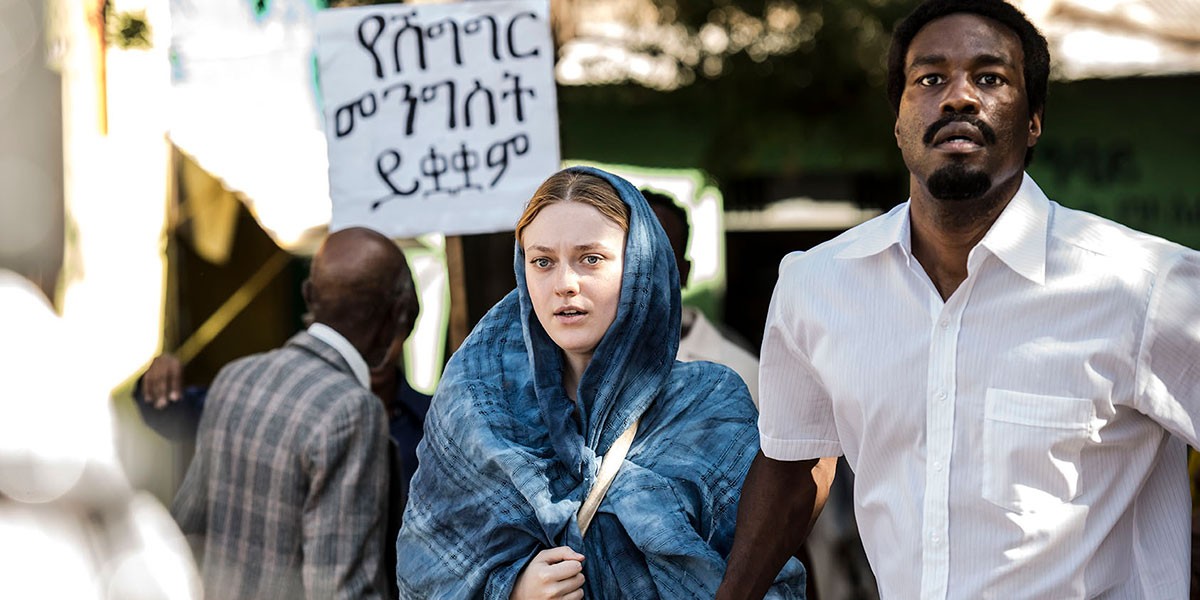“Sweetness in the Belly” has been mired in controversy since the release of images showing Dakota Fanning portraying a “white Ethiopian Muslim” during filming. Concerned folks cooked up a social media storm, outraged at the idea of a white woman representing the contemporary African refugee experience. However, Ethiopian director Zeresenay Berhane Mehari (“Difret”) defends the romantic drama as having his homeland at its heart, calling the aforementioned description of the protagonist a mischaracterization and suggesting the story’s true nature was misunderstood.
Gracefully adapted from Camilla Gibb’s award-winning 2005 novel of the same name, Laura Phillips’ screenplay follows Lilly Mitchell/Abdal (Fanning), a British orphan living in Ethiopia after being raised in Morocco and forced to flee for England in the ‘70s when civil war breaks out. Irish-Canadian-British production “Sweetness in the Belly” premiered at Toronto International Film Festival, and shelving the somewhat rash furor of the previous week, is there much to write home about?
READ MORE: 2019 Toronto International Film Festival: 25 Most Anticipated Movies
After a succinct expository title card outlining Ethiopia’s political situation in 1974, Mehari’s sophomore feature gets the ball rolling at London’s Stanstead Airport as Ethiopian refugees arrive in droves. The filmmaker soon acquaints his audience with Lilly, a woman landing in the paradox of a native country entirely unfamiliar to her, wasting zero time in establishing her substantial privileges as a white British citizen – ones she neither asks for nor necessarily wants, and ones denied to her Black counterparts.
Thereafter, the film weaves gently between two distinct narrative threads, distinguished not only by events but also by contrasting color palettes. First, we trace Lilly’s bumpy path to integration and acceptance in damp, dreary England, watching fondly as she earnestly struggles to surmount the obstacles London life throws in her path. Second, we move from Lilly’s colorful Moroccan upbringing by a Sufi master (Estad Tewfik Yusuf Mohamed) after being mysteriously deserted by her hippy parents (Gavin Drea and Sophie Kennedy Clark), through adulthood in Ethiopia’s ancient Harar, and to her eventual escape from the terrors of the country’s political unrest.
READ MORE: 2019 Fall Preview: The 45 Most Anticipated Films
Across its fairly digestible 110-minute runtime, this capably directed tale of religion, politics, and romance somehow finds space for the odd – and fully unexpected – flash of light humor. These are much appreciated in a movie understandably solemn in tone, realistically echoing the comic relief most humans welcome in otherwise agonizing periods of turmoil. And boy, we sure feel Lilly’s suffering as she longs for the love of her life Aziz (Yahya Abdul-Mateen II), tormented as she wonders of the idealistic doctor’s fate in war-torn Ethiopia. Yet, bar one tear-jerking scene in which Lilly bids farewell to fellow refugee and housemate Amina (a vibrant Wunmi Mosaku), Mehari fails to tug at viewers’ heartstrings with crucial scenes that should be all about the poignancy. Todor Kobakov’s original score, which is largely spellbinding, but disappointingly spartan, at pivotal moments in the plot, plays a small part in this respect.
Fanning (“Once Upon a Time in Hollywood”) portrays a modest, yet gutsy, woman resolved to remain faithful to her unique identity, one crafted by a marriage of stoicism and unlikely – but not impossible – circumstances of adversity. In doing so, the actress acquits herself just as impressively as in any past role, highlighting the broad range she’s capable of. The one component of Fanning’s committed performance that does niggle is her forced received pronunciation, which Lilly has inexplicably retained since childhood. It’s interesting to muse on what Saoirse “Queen of Accents” Ronan – who bowed out of the project, maybe because she foresaw the impending social media polemic – intended to do with the character.
For its few flaws, “Sweetness in the Belly” hits plenty of the right notes, featuring a breadth of insight possible only when a filmmaker truly knows the place the story is set. Unlikely to achieve mainstream success, especially following the hoo-ha about its supposed whitewashing, this romantic drama will most appeal to those with a taste for stories based on historical events but told from an unusual perspective. Gibb’s book could easily have been a straight refugee tale, but placing a white Muslim at its center creates a special sort of displacement-ception, giving “Sweetness in the Belly” its edge. [B]





